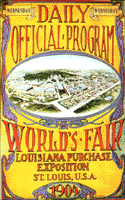HISTORY OF THE MODERN OLYMPICS
Saint Louis, Missouri, United States, 1904
 |
| Olympic posters from the Archives, Olympic Museum Lausanne, from the book The Olympic Spirit, published by Tehabi Books |
The overall results were predictably lopsided, with Americans earning 80 of the 100 gold medals and 238 medals in all. The track-and-field events, held on the campus of Washington University, featured Ray Ewry, who repeated his Paris performance by winning gold medals in all three standing-jump events. American athletes Archibald Hahn, Jim Lightbody, and Harry Hillman each won three gold medals as well. Thomas Kiely of Ireland paid his own fare to the Games rather than compete under the British flag and won the gold medal in an early version of the decathlon. Kiely and his competitors performed the 100-yard sprint, shot put, high jump, 880-yard walk, hammer throw, pole vault, 120-yard hurdles, 56-pound weight throw, long jump, and mile run, all in a single day. The swimming events took place in an artificial lake on the fairgrounds. Zoltán Halmay of Hungary and Charles Daniels of the United States each won two gold medals in individual swimming, while Emil Rausch of Germany won three. Boxing made its Olympic debut in 1904.
The Intercalated Games, held in 1906 in Athens, Greece, are not included as part of the official Olympic Record. However, these Games helped to revive the Olympic movement after poor showings in Paris and St. Louis. Athens again embraced the Games, turning out large and enthusiastic crowds that stirred renewed interest in the Olympics.
Introduction * Early History * Revival of the Olympics * Organization of the Modern Games